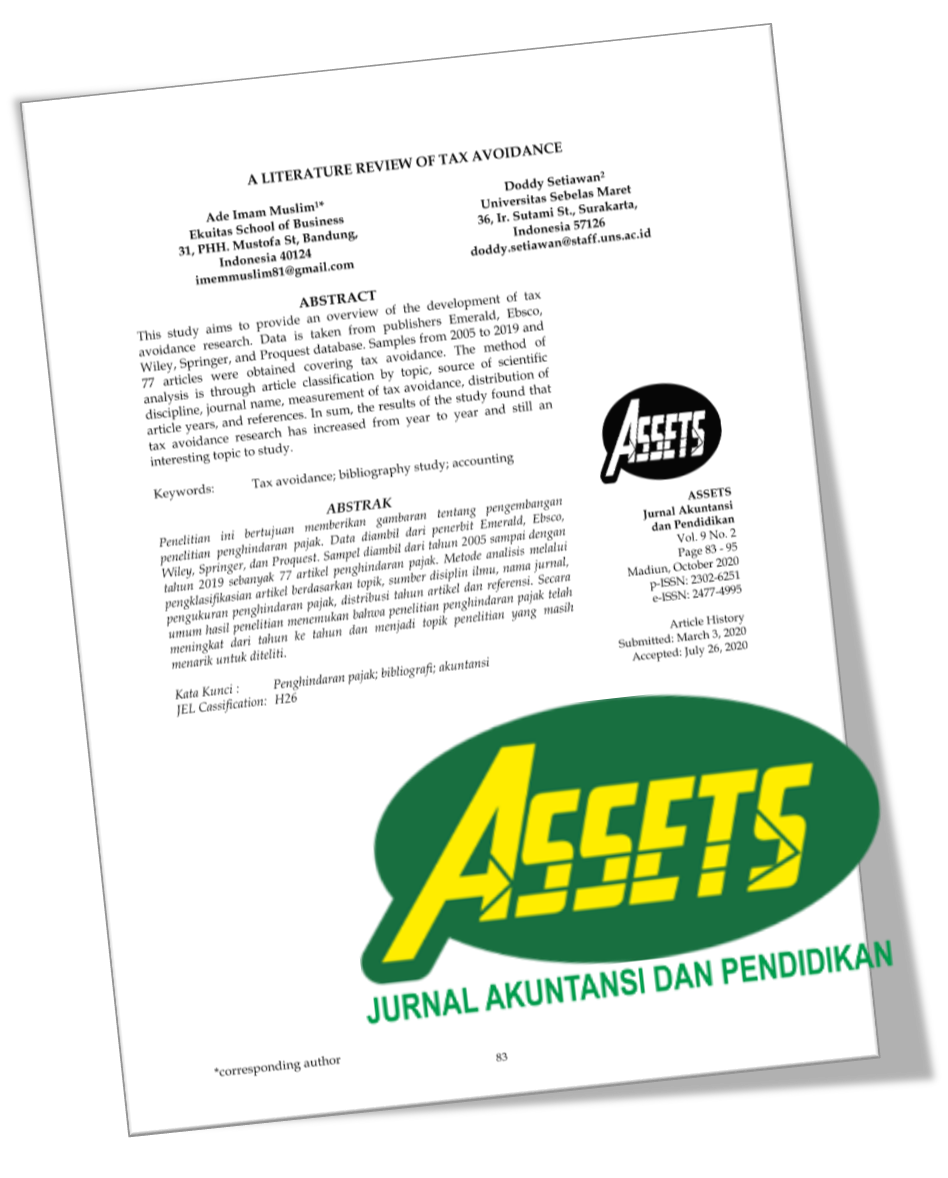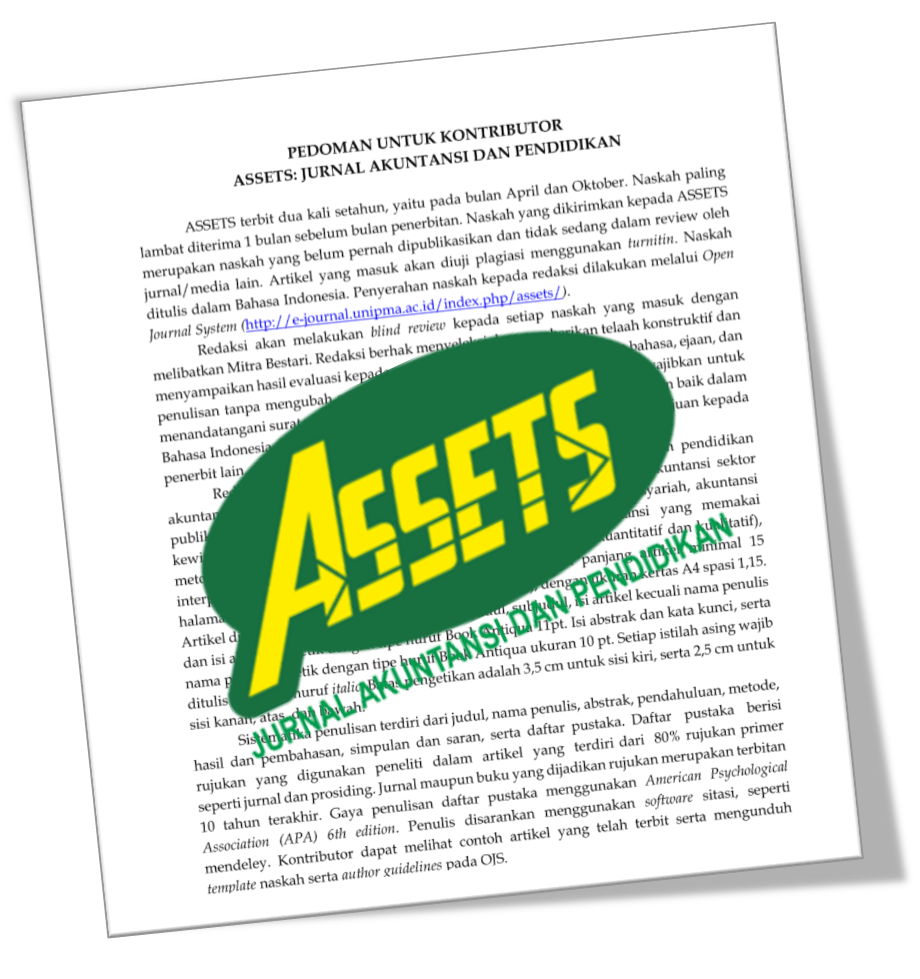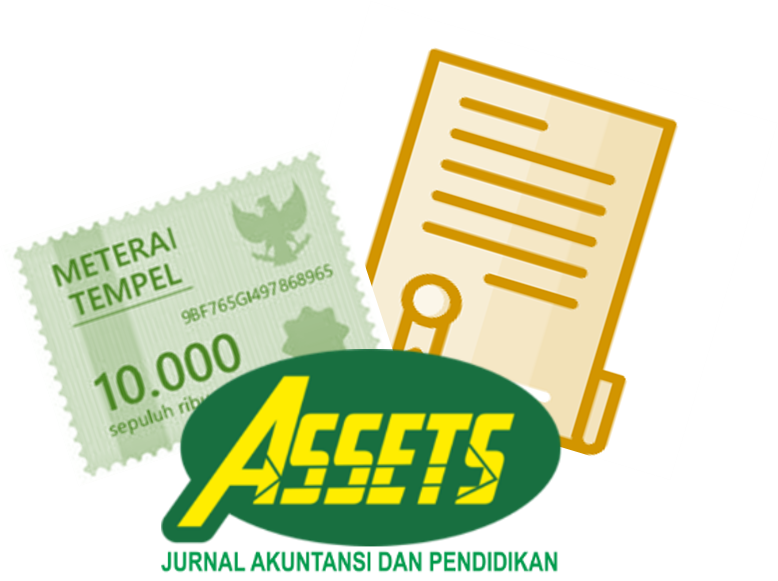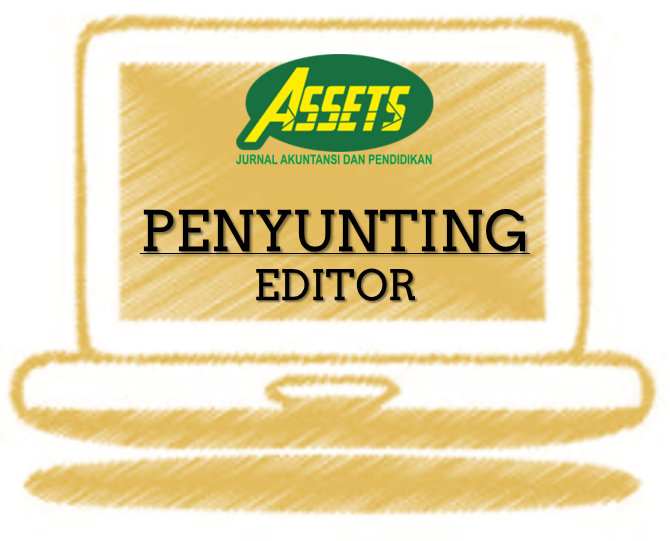ONLINE LEARNING EFFECTIVENESS: THROUGH DIGITAL LITERACY AND TEACHER’S PROFESSIONAL COMPETENCE
DOI:
https://doi.org/10.25273/jap.v11i1.10810Keywords:
Digital Literacy, Online Learning Effectiveness, Teacher’s Professional Competence, Efektivitas Pembelajaran Daring, Literasi Digital, Kompetensi Profesional GuruAbstract
ABSTRACT
This study aims to measure and analyze the effect of digital literacy and teachers' professional competence on the effectiveness of online learning. This research is quantitative research with a quantitative explanatory approach using a questionnaire. The research sample was 190 students of 11th-grade Financial Accounting using the purposive sampling technique. The data analysis used is multiple linear regression. The results showed that (1) digital literacy had a positive effect on the effectiveness of online learning, and (2) teachers' professional competence had a positive effect on the effectiveness of online learning. Teachers can use the findings in this study to increase the effectiveness of online learning. Teachers must master the material of learning and utilize technology to provide interactive online learning. Interactive online learning will help students improve problem-solving skills, critical thinking abilities, and adaptability.
Â
ABSTRAK
Penelitian ini bertujuan untuk mengukur dan menganalisis pengaruh literasi digital dan kompetensi profesional guru terhadap efektivitas pembelajaran daring. Penelitian ini penelitian kuantitatif dengan pendekatan eksplanatif menggunakan kuesioner. Pengambilan sampel menggunakan teknik purposive sampling sejumlah 190 siswa kelas XI Akuntansi Keuangan dan Lembaga. Analisis data yang digunakan adalah regresi linier berganda. Hasil penelitian menunjukkan bahwa (1) literasi digital berpengaruh positif terhadap efektivitas pembelajaran daring, dan (2) kompetensi profesional guru berpengaruh positif terhadap efektivitas pembelajaran daring. Temuan dalam penelitian ini dapat digunakan oleh guru dalam upaya meningkatkan efektivitas pembelajaran daring dimana guru harus mampu menguasai materi secara menyeluruh dan memanfaatkan teknologi untuk menyediakan pembelajaran daring yang nyaman dan interaktif. Pembelajaran daring yang interaktif akan membantu siswa memiliki keterampilan pemecahan masalah, kemampuan berpikir kritis, dan kemampuan beradaptasi di kalangan siswa.
Downloads
References
Adnan, M., & Anwar, K. (2020). Online Learning Amid the COVID-19 Pandemic: Students Perspectives. Journal of Pedagogical Research, 2(1), 45–51. https://doi.org/10.33902/jpsp.2020261309
Ali, Z., Busch, M., Qaisrani, M. N., & Ur-Rehman, H. (2020). The Influence of Teachers’ Professional Competencies on Students Achievement: A Quantitative Research Study. American Research Journal of Humanities & Social Science, 3(6), 45–54.
Arnanto, G. C., & Triyono, M. B. (2014). Keefektifan Pembelajaran Berbantuan Internet di SMK se-Kota Yogyakarta Kompetensi Keahlian Teknik Komputer dan Jaringan. Jurnal Pendidikan Vokasi, 4(3), 318–332. https://doi.org/10.21831/jpv.v4i3.2557
Bangert, A. W. (2008). The Development and Validation of the Student Evaluation of Online Teaching Effectiveness. Computers in the Schools, 25(1–2), 25–47. https://doi.org/10.1080/07380560802157717
Basilaia, G., & Kvavadze, D. (2020). Transition to Online Education in Schools during a SARS-CoV-2 Coronavirus (COVID-19) Pandemic in Georgia. Pedagogical Research, 5(4), 1–9. https://doi.org/10.29333/pr/7937
Caena, F., & Redecker, C. (2019). Aligning Teacher Competency Frameworks to 21st Century Challenges: The Case for the European Digital Competence Framework for Educators (DIGCOMPEDU). European Journal of Education, 54(3), 356–369. https://doi.org/10.1111/ejed.12345
Cooper, D. R., & Schindler, P. S. (2014). Business Research Methods. New York: McGraw-Hill/Irwin.
Dhawan, S. (2020). Online Learning: A Panacea in the Time of COVID-19 Crisis. Journal of Educational Technology Systems, 1(1), 1–18. https://doi.org/10.1177/0047239520934018
Eshet-Alkalai, Y. (2004). Digital Literacy: A Conceptual Framework for Survival Skills in the Digital Era. Journal of Educational Multimedia and Hypermedia, 13(1), 93–106.
Falloon, G. (2020). From Digital Literacy to Digital Competence: The Teacher Digital Competency (TDC) Framework. Educational Technology Research and Development, 68(5), 2449–2472. https://doi.org/10.1007/s11423-020-09767-4
Firmansyah, R., Putri, D. M., Wicaksono, M. G. S., Putri, S. F., Widianto, A. A., & Palil, M. R. (2021). Educational Transformation: An Evaluation of Online Learning due to COVID-19. International Journal of Emerging Technologies in Learning, 16(7), 61–76.
Ghozali, I. (2016). Aplikasi Analisis Multivariate dengan Program IBM SPSS 26. Semarang: Badan Penerbit Universitas Diponegoro.
Gilster, P. (1997). Digital Literacy. New York: Wiley Computer Pub.
Gurung, B., & Rutledge, D. (2014). Digital Learners and The Overlapping of Their Personal and Educational Digital Engagement. Computers and Education, 77(3), 91–100. https://doi.org/10.1016/j.compedu.2014.04.012
Hair, J. F., Black, W. C., Babin, B. J., & Anderson, R. E. (2010). Multivariate Data Analysis (7th Ed). New Jersey: Pearson Prentice Hall.
Joy, E. H., & Garcia, F. E. (2000). Measuring Learning Effectiveness: A New Look at No-Significant-Difference Findings. Journal of Asynchronous Learning Network, 4(1), 33–39. https://doi.org/10.24059/olj.v4i1.1909
Kebritchi, M., Lipschuetz, A., & Santiague, L. (2017). Issues and Challenges for Teaching Successful Online Courses in Higher Education: A Literature Review. Journal of Educational Technology Systems, 46(1), 4–29. https://doi.org/10.1177/0047239516661713
Keeton, M. T. (2004). Best Online Instructional Practices: Report of Phase I of an Ongoing Study. Journal of Asynchronous Learning Networks, 8(2), 75–100.
Kidd, W., & Murray, J. (2020). The Covid-19 Pandemic and Its Effects on Teacher Education in England: How Teacher Educators Moved Practicum Learning Online. European Journal of Teacher Education, 43(4), 542–558. https://doi.org/10.1080/02619768.2020.1820480
Kim, K., & Bonk, C. J. (2006). The Future of Online Teaching and Learning in Higher Education: The Survey Says…. Educause Quarterly, 29(4), 22–30.
Knutsson, O., Blåsjö, M., Hållsten, S., & Karlström, P. (2012). Identifying Different Registers of Digital Literacy in Virtual Learning Environments. Internet and Higher Education, 15(4), 237–246. https://doi.org/10.1016/j.iheduc.2011.11.002
König, J., Jäger-Biela, D. J., & Glutsch, N. (2020). Adapting to Online Teaching during COVID-19 School Closure: Teacher Education and Teacher Competence Effects among Early Career Teachers in Germany. European Journal of Teacher Education, 43(4), 608–622. https://doi.org/10.1080/02619768.2020.1809650
Lie, A., Tamah, S. M., Gozali, I., Triwidayati, K. R., Utami, T. S. D., & Jemadi, F. (2020). Secondary School Language Teacher’s Online Learning Engagement during the Covid-19 Pandemic in Indonesia. Journal of Information Technology Education: Research, 19(3), 803–832.
Ludwikowska, K. (2019). Teacher Competence Inventory: An Empirical Study on Future-Oriented Competences of the Teaching Profession in Higher Education in India. Education and Training, 61(9), 1123–1137. https://doi.org/10.1108/ET-12-2018-0266
Mailizar, Almanthari, A., Maulina, S., & Bruce, S. (2020). Secondary School Mathematics Teachers’ Views on E-Learning Implementation Barriers during the COVID-19 Pandemic: The Case of Indonesia. Eurasia Journal of Mathematics, Science, and Technology Education, 16(7), 1–9. https://doi.org/10.29333/EJMSTE/8240
Mohammadyari, S., & Singh, H. (2015). Understanding the Effect of E-Learning on Individual Performance: The Role of Digital Literacy. Computers and Education, 82(4), 11–25. https://doi.org/10.1016/j.compedu.2014.10.025
Montoya, S. (2018). Defining literacy. United Nations Educational, Scientific and Cultural Organization (UNESCO). https://doi.org/10.1075/aral.9.2.01gra
Nelson, K., Courier, M., & Joseph, G. (2011). Teaching Tip: An Investigation of Digital Literacy Needs of Students. Journal of Information Systems Education, 22(2), 95–113.
Ng, W. (2012). Can We Teach Digital Natives Digital Literacy?. Computers and Education, 59(2), 1065–1078. https://doi.org/10.1016/j.compedu.2012.04.016
Nurhamsah, R., Sudiyanto, & Sumaryati, S. (2016). Kompetensi Profesional Guru dalam Pembelajaran Akuntansi di Sekolah Menengah Kejuruan Negeri Kota Surakarta. Jurnal Tata Arta UNS, 2(1), 62–72.
Partlow, K. M., & Gibbs, W. J. (2003). Indicators of Constructivist Principles in Internet-Based Courses. Journal of Computing Higher Education, 14(2), 68–97.
Perdana, R., Yani, R., Jumadi, J., & Rosana, D. (2019). Assessing Students’ Digital Literacy Skill in Senior High School Yogyakarta. JPI (Jurnal Pendidikan Indonesia), 8(2), 169–177. https://doi.org/10.23887/jpi-undiksha.v8i2.17168
Piaget, J. (1977). Topics in Cognitive Development Volume 1 (Equilibration: Theory, Research, and Application). New York: Plenum Press.
Pratama, W. A., Hartini, S., & Misbah. (2019). Analisis Literasi Digital Siswa Melalui Penerapan E-Learning Berbasis Schoology. Jurnal Inovasi Dan Pembelajaran Fisika, 6(1), 9–13.
Prior, D. D., Mazanov, J., Meacheam, D., Heaslip, G., & Hanson, J. (2016). Attitude, Digital Literacy, and Self Efficacy: Flow on Effects for Online Learning Behavior. Internet and Higher Education, 29(3), 91–97. https://doi.org/10.1016/j.iheduc.2016.01.001
Putri, I. D. T., & Ambarwati, R. (2019). An Effort in Teaching Invertebrates and Training Digital Literacy to the Students. Journal of Physics: Conference Series, 1417(5), 1–9. https://doi.org/10.1088/1742-6596/1417/1/012075
Quaicoe, J. S., & Pata, K. (2020). Teachers’ Digital Literacy and Digital Activity as Digital Divide Components among Basic Schools in Ghana. Education and Information Technologies, 29(3), 1–19. https://doi.org/10.1007/s10639-020-10158-8
Rahmah, A. (2015). Digital Literacy Learning System for Indonesian Citizen. Procedia Computer Science, 72, 94–101. https://doi.org/10.1016/j.procs.2015.12.109
Rahmawati, M., & Suryadi, E. (2019). Guru sebagai Fasilitator dan Efektivitas Belajar Siswa (Teachers as a Facilitator and the Effectiveness of Student Learning). Jurnal Pendidikan Manajemen Perkantoran, 4(1), 49–54. https://doi.org/10.17509/jpm.v4i1.14954
Reyes-Fournier, E., Cumella, E. J., Blackman, G., March, M., & Pedersen, J. (2020). Development and Validation of the Online Teaching Effectiveness Scale. Online Learning Journal, 24(2), 111–127. https://doi.org/10.24059/olj.v24i2.2071
Riel, J., & Hinson, B. (2012). Charting Digital Literacy: A Framework for Information Technology and Digital Skills Education in the Community College. SSRN Electronic Journal, 12(3), 1–22. https://doi.org/10.2139/ssrn.2781161
RodrÃguez-De-dios, I., Igartua, J. J., & González-Vázquez, A. (2016). Development and Validation of a Digital Literacy Scale for Teenagers. Technological Ecosystems for Enhancing Multiculturality (TEEM), 11(2), 1067–1072. https://doi.org/10.1145/3012430.3012648
Rohmawati, A. (2015). Efektivitas Pembelajaran. Jurnal Pendidikan Usia Dini, 9(1), 15–32. https://doi.org/10.21009/JPUD.091.02
Safitri, F. E. (2019). Pengaruh Persepsi Siswa tentang Kompetensi Pedagogik dan Kompetensi Profesional Guru terhadap Hasil Belajar Siswa Kelas X SMKN 12 Malang yang dimoderasi oleh Variabel Kemandirian Belajar Siswa. Skripsi tidak diterbitkan. Malang: FE UM.
Sarwar, H., Akhtar, H., Naeem, M. M., Khan, J. A., Waraich, K., Shabbir, S., Hasan, A., & Khurshid, Z. (2020). Self-Reported Effectiveness of E-Learning Classes during COVID-19 Pandemic: A Nation-Wide Survey of Pakistani Undergraduate Dentistry Students. European Journal of Dentistry, 14(3), 1–10. https://doi.org/10.1055/s-0040-1717000
Schunk, D. H. (2012). Learning Theories: An Educational Perspective. Boston: Pearson Education, Inc.
Shopova, T. (2014). Digital Literacy Students and Its Improvement at the University. Journal on Efficiency and Responsibility in Education and Science, 7(2), 26–32. https://doi.org/10.7160/eriesj.2014.070201.Introduction
Shrestha, M., & Dangol, R. (2019). Learning Readiness and Educational Achievement among School Students. The International Journal of Indian Psychology, 7(2), 465–476. https://doi.org/10.25215/0702.056
Sipayung, R., Sihotang, D. O., & Batu, J. L. (2021). Persepsi Guru terhadap Efektivitas Pembelajaran Online di Masa Pandemi Covid-19. Jurnal Ilmiah Aquinas, 4(2), 311–321.
Song, L., Singleton, E. S., Hill, J. R., & Koh, M. H. (2004). Improving Online Learning: Student Perceptions of Useful and Challenging Characteristics. Internet and Higher Education, 7(2), 59–70. https://doi.org/10.1016/j.iheduc.2003.11.003
Sugeng, B. (2020). Fundamental Metodologi Penelitian Kuantitatif (Eksplanatif). Yogyakarta: Deepublish.
Suhandani, D., & Kartawinata, J. (2014). Identifikasi Kompetensi Guru Sebagai Cerminan Profesionalisme Tenaga Pendidik di Kabupaten Sumedang. Mimbar Sekolah Dasar, 1(2), 33–42. https://doi.org/10.17509/mimbar-sd.v1i2.874
Sulastri, Fitria, H., & Martha, A. (2020). Kompetensi Profesional Guru dalam Meningkatkan Mutu Pendidikan. Journal of Education Research, 1(3), 258–264. https://doi.org/10.37985/jer.v1i3.30
Swan, K. (2003). Learning Effectiveness Online: What the Research Tells Us. Elements of Quality Online Education, Practice and Direction, 4(1), 13–45. https://doi.org/10.1111/j.1467-8535.2005.00519.x
Tang, C. M., & Chaw, L. Y. (2016). Digital Literacy: A Prerequisite for Effective Learning in a Blended Learning Environment?. The Electronic Journal of Eâ€Learning, 14(1), 54–65.
Tang, Y. M., Chen, P. C., Law, K. M. Y., Wu, C. H., Lau, Y., Guan, J., He, D., & Ho, G. T. S. (2021). Comparative Analysis of Student’s Live Online Learning Readiness during the Coronavirus (COVID-19) Pandemic in the Higher Education Sector. Computers and Education, 168(4), 1–17. https://doi.org/10.1016/j.compedu.2021.104211
Tigelaar, D. E. H., Dolmans, D. H. J. M., Wolfhagen, I. H. A. P., & Van-Der-Vleuten, C. P. M. (2004). The Development and Validation of a Framework for Teaching Competencies in Higher Education. Higher Education, 48(3), 253–268. https://doi.org/10.1023/B:HIGH.0000034318.74275.e4
Utami, I. T. (2019). Analisis Pengaruh Kompetensi Profesional Dosen dan Fasilitas Belajar terhadap Prestasi Belajar Mahasiswa Akademi Sekretari Budi Luhur pada Masa Pandemik/Covid-19. Jurnal Maneksi, 8(2), 223–229.
Walia, P., Tulsi, P. K., & Kaur, A. (2019). Student Readiness for Online Learning in Relation to Gender and Stream of Study. IEEE Learning With MOOCS, (LWMOOCS), 23(3), 21–25. https://doi.org/10.1109/LWMOOCS47620.2019.8939651
Wardoyo, C., Herdiani, A., & Sulikah, S. (2017). Teacher Professionalism: Analysis of Professionalism Phases. International Education Studies, 10(4), 90–100. https://doi.org/10.5539/ies.v10n4p90
Waycott, J., Bennett, S., Kennedy, G., Dalgarno, B., & Gray, K. (2010). Digital Divides? Student and Staff Perceptions of Information and Communication Technologies. Computers and Education, 54(4), 1202–1211. https://doi.org/10.1016/j.compedu.2009.11.006
Yilmaz, K. (2011). The Cognitive Perspective on Learning: Its Theoretical Underpinnings and Implications for Classroom Practices. The Clearing House: A Journal of Educational Strategies, Issues, and Ideas, 84(5), 204–212. https://doi.org/10.1080/00098655.2011.568989
Yustika, G. P., & Iswati, S. (2020). Digital Literacy in Formal Online Education: A Short Review. Dinamika Pendidikan, 15(1), 66–76. https://doi.org/10.15294/dp.v15i1.23779 1
Zhang, D., Zhou, L., Briggs, R. O., & Nunamaker, J. F. (2006). Instructional Video in E-Learning: Assessing the Impact of Interactive Video on Learning Effectiveness. Information and Management, 43(1), 15–27. https://doi.org/10.1016/j.im.2005.01.004
Downloads
Additional Files
- KUESIONER_PENGUKURAN EFEKTIVITAS PEMBELAJARAN ONLINE: DITINJAU DARI DIGITAL LITERACY DAN KOMPETENSI PROFESIONAL GURU
- LAMPIRAN OUTPUT_PENGUKURAN EFEKTIVITAS PEMBELAJARAN ONLINE: DITINJAU DARI DIGITAL LITERACY DAN KOMPETENSI PROFESIONAL GURU
- SLIP PEMBAYARAN
- SURAT PERNYATAAN BEBAS PLAGIASI
- SLIP PEMBAYARAN PUBLIKASI_PENGUKURAN EFEKTIVITAS PEMBELAJARAN ONLINE: DITINJAU DARI DIGITAL LITERACY DAN KOMPETENSI PROFESIONAL GURU
Published
Issue
Section
License
Perjanjian Lisensi dan Hak Cipta
Saat mengirimkan naskah ke jurnal, penulis menyatakan bahwa:
- Mereka diberi wewenang oleh rekan penulisnya untuk masuk ke dalam perjanjian ini.
- Karya yang dimaksud belum pernah diterbitkan secara resmi sebelumnya, kecuali dalam bentuk abstrak atau sebagai bagian dari kuliah, resensi, tesis, atau overlay jurnal yang diterbitkan.
- Karya yang dimaksud tidak sedang dipertimbangkan untuk diterbitkan di tempat lain,
- Publikasi karya yang dimaksud telah disetujui oleh semua penulis dan oleh otoritas yang bertanggung jawab - secara tahu sama tahu atau eksplisit - dari lembaga tempat pekerjaan itu dilakukan.
- Mereka mengamankan hak untuk mereproduksi materi apa pun yang telah diterbitkan atau dilindungi hak cipta di tempat lain.
- Mereka menyetujui lisensi dan perjanjian hak cipta berikut.
Hak Cipta
Penulis yang menerbitkan dengan ASSETS: Jurnal Akuntansi dan Pendidikan menyetujui persyaratan berikut:
- Penulis mempertahankan hak cipta dan memberikan jurnal hak publikasi pertama dengan karya yang secara bersamaan dilisensikan di bawah Lisensi Atribusi Creative Commons (CC BY-SA 4.0) yang memungkinkan orang lain untuk berbagi karya dengan pengakuan kepenulisan karya dan publikasi awal di jurnal ini.
- Penulis dapat masuk ke dalam pengaturan kontrak tambahan yang terpisah untuk distribusi non-eksklusif dari versi jurnal yang diterbitkan dari karya tersebut (misalnya, mempostingnya ke repositori institusional atau menerbitkannya dalam sebuah buku), dengan pengakuan publikasi awalnya di jurnal ini.
- Penulis diizinkan dan didorong untuk memposting karya mereka secara daring (misalnya di repositori institusional atau di situs web mereka) sebelum dan selama proses pengiriman, karena dapat menghasilkan pertukaran yang produktif, serta kutipan lebih awal dan lebih besar dari karya yang diterbitkan.
License and Copyright Agreement
In submitting the manuscript to the journal, the authors certify that:
- Their co-authors authorize them to enter into these arrangements.
- The work described has not been formally published before, except as an abstract or part of a published lecture, review, thesis, or overlay journal.
- That it is not under consideration for publication elsewhere,
- That its publication has been approved by all the author(s) and by the responsible authorities – tacitly or explicitly – of the institutes where the work has been carried out.
- They secure the right to reproduce any material already published or copyrighted elsewhere.
- They agree to the following license and copyright agreement.
Copyright
Authors who publish with ASSETS: Jurnal Akuntansi dan Pendidikan agree to the following terms:
- Authors retain copyright and grant the journal right of first publication with the work simultaneously licensed under a Creative Commons Attribution License (CC BY-SA 4.0) that allows others to share the work with an acknowledgment of the work's authorship and initial publication in this journal.
- Authors can enter into separate, additional contractual arrangements for the non-exclusive distribution of the journal's published version of the work (e.g., post it to an institutional repository or publish it in a book), with an acknowledgment of its initial publication in this journal.
- Authors are permitted and encouraged to post their work online (e.g., in institutional repositories or on their website) before and during submission, as it can lead to productive exchanges and earlier and more extraordinary citations of published work.

ASSETS: Jurnal Akuntansi dan Pendidikan is licensed under a Creative Commons Attribution-ShareAlike 4.0 International License.










